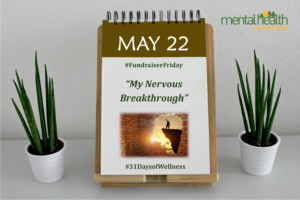Contributed by Laureen Guerriero, MHC Development Committee Co-Chair
 At 28, I battled a mental health challenge, a big one, it landed me in the psychiatric floor at Hartford Hospital for six weeks of my life. My family, friends and the public would judgmentally refer to this as a “nervous breakdown”. What does that even mean, and where the F did such a term originate? Of course, I asked Google about its origin… here are some interesting nuggets about this stigmatizing term from the American Journal of Psychiatry and the Mayo Clinic:
At 28, I battled a mental health challenge, a big one, it landed me in the psychiatric floor at Hartford Hospital for six weeks of my life. My family, friends and the public would judgmentally refer to this as a “nervous breakdown”. What does that even mean, and where the F did such a term originate? Of course, I asked Google about its origin… here are some interesting nuggets about this stigmatizing term from the American Journal of Psychiatry and the Mayo Clinic:
-
- “Its initial association was not to depression, anxiety, or psychosis but to symptoms associated with mental and physical exhaustion.”
- “The term does not exist in DSM-IV or ICD-10—or in their predecessors. It has no scientific definition and has never been part of the mental health professional’s lexicon.”
- “Its use extended to neurotic disorders in general (particularly those that were incapacitating or required hospitalization) and that its use as a euphemism for any form of mental disorder (including psychosis) appears to have started only after World War I.”
The bottom line, nervous breakdown is an old and stigmatizing term, please STOP using it. Words matter.
Getting Help Matters. You matter. Your Mental Health Matters. Mental and physical health are connected and equally important to your overall well-being.
Just like cancer, diabetes, and other physical diseases, all have signs and symptoms and so do mental health conditions. Please do not ignore important signs and symptoms. Early intervention is crucially important to ensure prompt and proper treatment.
So, during Mental Health Awareness Month, I chose to be vulnerable, to share my story, in the hope that you will listen, empathetically and won’t be afraid, embarrassed or scared to ask for help when you need it, and you will be able to tell your story.
When I decided to tell my story, I decided to call it my nervous breakthrough, because that is what my best friend called it when it happened and that is what it was.
The nutshell version: I was in psychotherapy working through childhood trauma associated with my father’s illness, he was diagnosed with Bipolar Disorder, an illness that effects an estimated 2.8% of adults in the U. S, and Schizophrenia at age 38. Not common with bipolar disorder, my dad would become violent, physically break things in our home, threaten us with knives and guns he kept in the house. He was in and out of the hospital a lot, his illness was devastating to him and traumatic for our family to say the least.
I was making good progress in therapy and then my therapist told me he was no longer going to do individual therapy but would be conducting group therapy in his home with his wife, a Social Worker. I was so disappointed and extremely sad I had built a good relationship with him and I did not want to start over to find another therapist. So, when he invited me to join the group, I did, not knowing if it was really what I needed. He thought I could benefit from the group work and I trusted him. It turned out to not be what I needed at all and it was detrimental to my progress. I then started experiencing symptoms of depression:
- Physical Symptoms: trouble sleeping/lack of sleep, loss of appetite and weight loss
- Behavioral Symptoms: Crying spells, withdrawal from others
- Psychological symptoms: Sadness, anxiety
My doctor prescribed me something for the anxiety, but it was not working. I had not eaten or slept in over a week and all my symptoms were getting worse. Desperate for help, when my therapists invited me to their home to work with me, I went. After 5 days there, delirious from the lack of sleep, I proceeded to get worse and they realized I needed more help than they could give me and took me to Hartford Hospital. Too little, too late.
It was awful, I remember little of the experience as they put me on so many drugs. I remember being embarrassed when family and friends visited me, the stigma of being on a psychiatric floor, not feeling like myself. I left the hospital after six weeks, given my dad’s history, I was diagnosed with bipolar disorder, placed on lithium, and assigned to a psychiatrist. I was not convinced they had me on the correct drug or got the diagnosis right. I was lucky to have friends and family to help me during this time. I saw the psychiatrist, she slept, yes, literally SLEPT through most of our hour-long sessions and was of no help. After a year of her less than stellar care, I found myself a new psychologist to get another opinion. Together, with her, a new psychiatrist that she and I trusted, continued psychotherapy, I got off the wrong medication and on the right medication and on a path to mental wellness. In addition to the right medication, I started a solid self-care program that included regular cardio exercise, hiking and being outside, eating healthy, finding humor in the tough times and connecting with people I love on a regular basis and volunteering with an outdoor organization leading inner city youth on outdoor adventures.
 I am now 57 and thankfully have been managing my depression and anxiety without another hospitalization. It has ebbed and flowed over the years and I continue to manage it daily. For a while I did not need medication to manage it. I listen to my body, on most days, I practice good self-care. That has changed over the years. I have added yoga and meditation and a daily dose of nature to my routine these days. Most importantly, I have a Health Care team I trust and respect and together we manage my whole health, physical and mental/behavioral health.
I am now 57 and thankfully have been managing my depression and anxiety without another hospitalization. It has ebbed and flowed over the years and I continue to manage it daily. For a while I did not need medication to manage it. I listen to my body, on most days, I practice good self-care. That has changed over the years. I have added yoga and meditation and a daily dose of nature to my routine these days. Most importantly, I have a Health Care team I trust and respect and together we manage my whole health, physical and mental/behavioral health.
5 Lessons from my Nervous Breakthrough:
-
- 1) Know and listen to your body, mind and soul and take good care of it, if something I not right, please, ask for help! Not sure where to start? Call your primary care physician or to access this free service, contact 1-800-842-1501 or email
-
- . For services in CT:
https://www.mhconn.org/service/
-
- / National Suicide Prevention Hotline: 800-273-8255
2) Have doctors that believe in whole health and find a team you trust. As one of my colleagues says, “finding a good therapist and/or psychiatrist is like finding the right pair of jeans, you may have to try on a few before you get the right fit.” Trust your gut and don’t put up with a Dr. sleeping on the job, find one you trust and can work with and tell your story to. It is essential to get it out, learn, let go and move on and be well.
3) Taking medication to help your mental health does not make you any less of a person, please do not judge yourself or others. We don’t judge those that take insulin, chemotherapy, or high blood pressure medication if they need to, do we?
4) Volunteer and give back to others in need. Because of my battle and my dad’s battle, I decided to use some of my volunteer energy to help MHC as their Development Committee Co-Chair, raising money and awareness to help fund their statewide programs that improve the Mental Health of people in CT.
5) Learn more about mental health so you can continue to help yourself and others. How? Sign up for Mental Health First Aid. I am a certified instructor for MHC and look forward to teaching an online class soon.
To show your support for Laureen this #FundraiserFriday, please consider making a donation in her honor to her #31DaysofWellness fundraiser at https://mhconn.networkforgood.com/projects/99593-laureen-guerriero-s-fundraiser. All donors who contribute $5 or more will receive a special Zoom invitation to Laureen’s Mindfully Wine: Grapes for Good session (see above video for details).

